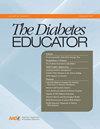美墨边境各州糖尿病自我管理行为、医疗保健获取和健康感知。
IF 3.9
Q1 Health Professions
引用次数: 3
摘要
本文章由计算机程序翻译,如有差异,请以英文原文为准。
Diabetes Self-Management Behaviors, Health Care Access, and Health Perception in Mexico-US Border States.
Purpose The purpose of this study was to describe diabetes self-management behaviors, diabetes health care access, and health perception for Mexican adults and Hispanics residing in the Mexico-US border region. Methods This study used data from the Behavior Risk Factor Surveillance System (BRFSS) survey diabetes items (n = 26) to assess characteristics of Hispanics in 4 Arizona border counties (n = 216) and cross-sectional data from a modified BRFSS in a convenience sample of adults residing in Monterrey, Mexico (n = 351). Data were analyzed for descriptive statistics with SPSS. Results The Mexico cohort was younger than the Arizona cohort (59.36 [11.5] vs 65.54 [11.1], respectively) and the mean length of time with type 2 diabetes was similar. Less than 10% (9.7%) of the Arizona cohort reported never monitoring blood glucose compared to 22.5% of the Mexico cohort. The mean (SD) number of times in the past 12 months the Mexico cohort saw their health care provider was 9.09 (6.8) vs 4.49 (8.3) for the Arizona cohort. Despite provider access, there were differences in self-management behaviors between the cohorts. Conclusions Due to environmental and policy factors in the Mexico-US border region, there continues to be a gap in evidence-based practice and uptake of self-management behaviors for adults with diabetes. Resources such as the BRFSS and shared practice guidelines would bridge this gap.
求助全文
通过发布文献求助,成功后即可免费获取论文全文。
去求助
来源期刊

Diabetes Educator
医学-内分泌学与代谢
CiteScore
4.00
自引率
0.00%
发文量
0
审稿时长
6-12 weeks
期刊介绍:
The Diabetes Educator (TDE) is the official journal of the American Association of Diabetes Educators (AADE). It is a peer-reviewed journal intended to serve as a reference source for the science and art of diabetes management.
TDE publishes original articles that relate to aspects of patient care and education, clinical practice and/or research, and the multidisciplinary profession of diabetes education as represented by nurses, dietitians, physicians, pharmacists, mental health professionals, podiatrists, and exercise physiologists.
 求助内容:
求助内容: 应助结果提醒方式:
应助结果提醒方式:


